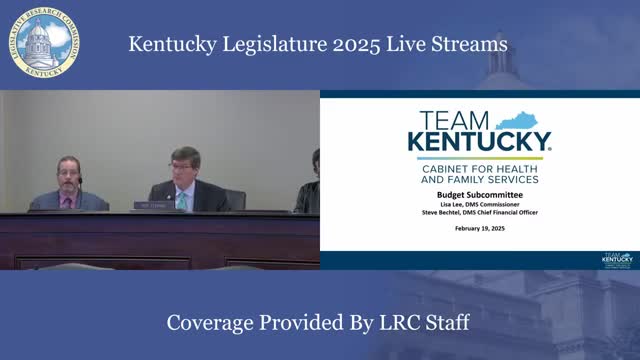Kentucky panel hears concerns over Medicaid waiver wait list, 70% rate implementation
Get AI-powered insights, summaries, and transcripts
Subscribe
Summary
State Medicaid officials briefed the Legislature’s budget review subcommittee on 1915(c) home- and community-based waivers, describing program size, wait-list mechanics and a partial (70%) implementation of a Guidehouse rate study that providers say is insufficient.
Commissioner Lisa Lee of the Kentucky Department for Medicaid Services told the General Assembly’s Budget Review Subcommittee on Health and Family Services that Kentucky’s Medicaid program is governed by Title XIX of the Social Security Act and is the state’s largest health program.
Lee said the department administers six 1915(c) home- and community-based waivers that let people who meet nursing-facility or intermediate-care level of care remain in their homes. "Without these waiver programs, the individuals would be in a facility," she said.
The department offered several program counts: about 485,000 Medicaid expansion members, more than 600,000 children eligible for Medicaid or Kentucky Children’s Health Insurance Program, roughly 69,000 enrolled providers, and $18.5 billion in Medicaid expenditures in 2024. Lee said the unduplicated wait list across all waivers is 13,933 individuals.
The committee focused on the cabinet’s recent implementation of a rate study developed by Guidehouse. Lee described the study as necessary because many waiver services are not covered by Medicare or commercial insurance and therefore lack clear market benchmarks. She said the General Assembly funded an increase tied to that study but the administration implemented roughly 70% of Guidehouse’s benchmark rates effective Jan. 1, 2025. Lee said the budget constrained the department’s choice about how much of the benchmark could be funded.
Amy Stade, CEO of the Kentucky Association of Private Providers, urged fuller use of the funds appropriated by the Legislature. "To say that providers and families were shocked and deeply concerned by this 70% implementation plan would be an understatement," Stade said, urging the state to apply the full appropriations to the benchmark increases. Stade told the committee the rate study’s recommended rates were intended to support wages near $15 an hour; she said 70% implementation supports about $10 an hour.
Committee members pressed for specifics about slots and funding. Lee explained there are "funded slots" (the number the state has allocated), "filled slots" (individuals currently in those slots) and reserved slots (held for people expected to return). She said only funds for individuals actually receiving services are expended; if a funded slot is empty the state does not draw down federal match for that slot. Lee acknowledged the committee’s questions about timing and promised to provide more detailed definitions and flow charts to staff.
Members also asked about federal Medicaid match (FMAP) risks. Lee and Steve Bechtel, DMS chief financial officer, said a reduction in enhanced FMAP percentages for specific activities or populations would require more state general-fund dollars to maintain current services. Bechtel said, for example, a one-percentage-point reduction for the Medicaid expansion population would cost about $75 million annually; he described other FMAP changes as dependent on federal legislative actions and on which IT or program activities are subject to different matching rates.
Lee described other implementation issues: the department is continuing to review physical, occupational and speech therapy rates separately and is working with sister agencies (Department for Aging and Independent Living; behavioral-health divisions) on program administration and participant-directed services. She said some waiver regulations and program design items were considered during an earlier redesign effort and remain under review.
The meeting included public testimony from Amy Stade and committee discussion of the rate-study public comment record. Stade noted the Guidehouse report was completed in November 2022 but released publicly in August 2024 and that state budget language in 2024 included general fund dollars to support implementation.
Votes at a glance: after the presentation and discussion the subcommittee reached quorum and, by voice vote, approved amendments from the prior week. The transcript records a voice vote with members saying "aye." The transcript does not record a roll-call tally.
The subcommittee asked DMS to provide additional written clarifications about slot definitions, funded-versus-filled accounting, and the fiscal mechanics of the rate implementation for distribution to members and staff.
